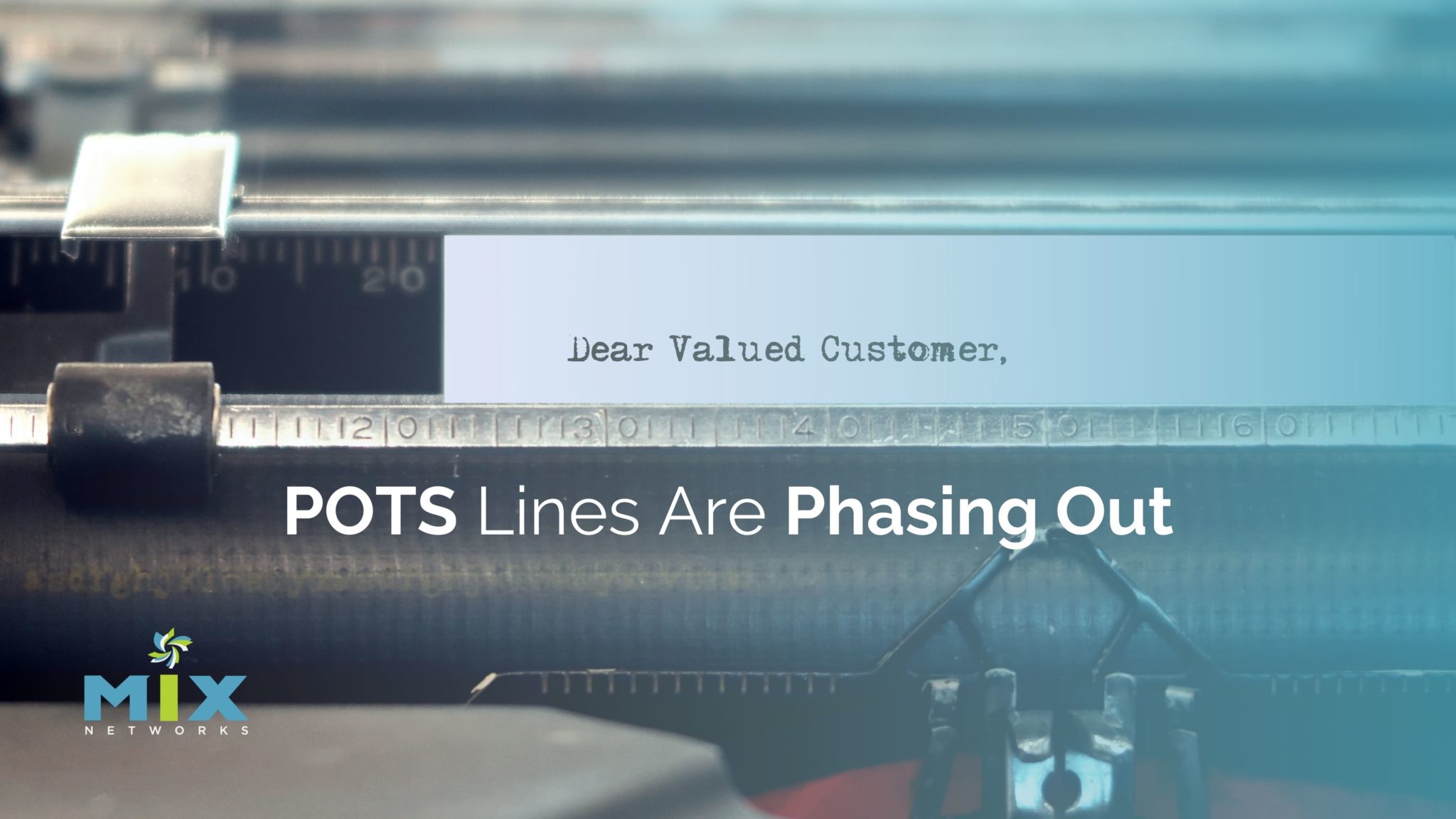You have probably heard the news. Major telcos such as AT&T and Verizon are no longer supporting or adding new accounts to their Plain Old Telephone Service (or POTS) solution.
But first. What are POTS Telephone Lines? POTS lines are the twisted pair of copper wires of the original telecom network. POTS Lines were what was used when Alexander Graham Bell first began connecting his network of telephones. These wires are more than sufficient for handling voice traffic, but our communications network is relying more on digital transmissions such as video and texting, which the POTS Telephone Lines are unable to process. And POTS Telephone Lines are not backward compatible, meaning you can’t place a digital receiver on a POTS line and have all the features and functionality of the new phone work.
So. If you haven’t yet, you will soon receive a notice similar to this:
Dear Business Owner:
Effective immediately, the cost of your current POTS telephone line phone services will be increased by 50%. Your new price for the services will be $145 per line, Please be aware that your current POTS line phone services will no longer be available after February 1, 202X. We do have some alternate IP-based communications solutions that might fit your needs and allow you to remain at your current pricing structure. Please contact us at your earliest convenience.
As recently as last October, Verizon customers began receiving notices just like these, notifying them of the end of life for their copper lines. Both US and UK providers have indicated that they plan to complete a full phase-out by 2030 and that every user will be on the newer IP-based communications solutions.
Why? It was just two years ago when The National Center for Health Statistics stated that up to 54% of all U.S. households depended solely on cell phones for communication needs, up from 16% in 2006 and that only 6% of the population are actually using POTS lines. The physical disintegration of the copper infrastructure has significantly increased the maintenance costs while usage quickly declined and as a result the major telephone providers successfully petitioned to phase out support of the copper infrastructure for the current PSTN, signaling the death of the analog telephony era.
A Perfect Storm: COVID-19
Digital IP-based solutions proved their mettle in 2020 at the height of the COVID-19 economic shutdowns. Late adopters were forced to transition to cellphones and VoIP solutions just to keep their staff and customers connected. And what they found was just how easily these technologies managed the transition. The flexibility and agility of these solutions proved to be a significant asset as businesses were forced to send their workers home to work. It’s now clear that work can be done, and well, from home, and the benefits of such a work environment apply to both employees and employers. As we move into this new year, one thing is for certain. There is no “returning to normal.” Instead, we will embrace the new “abnormal.” This can only be seen as an asset to further enhancements and transformations for businesses, right?
But What About My POTS Telephone Line Devices?
Even with this rapid transformation and transition to VoIP and digital IP-Communications solutions, many of us still rely on the analog communications solutions of days gone by. It’s fairly safe to say that every business has one or two POTS lines devices currently servicing critical business applications, such as fax machines, elevator alarms, and fire and burglar emergency systems. Because of certain technological requirements, these solutions did not mesh well with the newer digital technologies and since the general assumption was that the copper lines would never die, the manufacturers did not pursue modifications that would help these devices work on VoIP and digital IP solutions. This leaves business owners in a technical and financial conundrum and scrambling to find a solution.
Do you have a backup plan?
Whether you have begun the process of phasing out your internal analog lines or not, it’s clear that soon, you won’t have a choice. The fees for analog copper lines will continue to grow significantly before being phased out entirely. If you haven’t yet, you need to make a backup plan for how you will continue to communicate after the copper line retirement. As it stands today, businesses like yours have two options: Full rip and replace of the entire communications infrastructure or wireless POTS Line Replacement devices. Most of us have already invested significant time and investment into our current infrastructures, so a full rip and replace is not only cost prohibitive…it will also require a significant investment in time. Which many of us do not have.
Fortunately, the alternate solution is surprisingly simple. One device can convert your analog POTS telephone line devices, such as fax machines, elevator alarms, and fire and burglar alarms, to enable the signals to be sent via digital technologies. How?
POTS IN A BOX® is an LTE/Cellular/Wi-Fi/PSTN/FirstNet-capable router that can enable many combinations of legacy analog wireline in-band Voice, M2M, Data, DTMF, Analog Data Modem Tones, Fax, and Alarm System Signals. These functions – which were historically supported by POTS Lines – can now be delivered via POTS IN A BOX® and carried over LAN or WAN internet connections such as fiber optics or cable connections. Now you can keep the systems and devices you have invested in so thoroughly over the past years and still enter into the digital era, all by plugging in one simple device to bridge the digital divide.
Regardless of which option you choose, it is no longer a question of if but how. The phase-out of the analog lines is in progress. It is imperative that you create a backup plan now and continue to build on the success you have already achieved.








